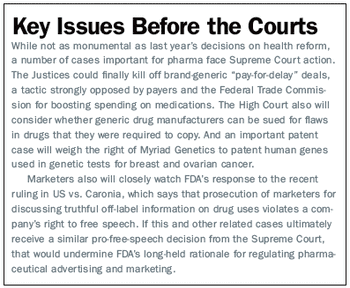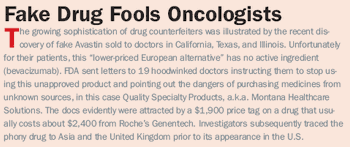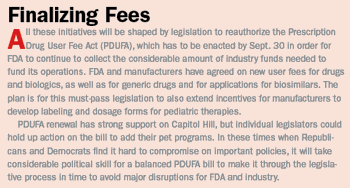
Legal battles and regulatory missteps undermine access to low-cost generics, at home and abroad, writes Jill Wechsler.
Jill Wechsler is Pharm Exec's Washington Corespondent

Legal battles and regulatory missteps undermine access to low-cost generics, at home and abroad, writes Jill Wechsler.

Just about every federal program and affected interest group is pressing for relief from the 8% across-the-board cuts in funding imposed by the budget sequestration mandate. Recent fast action on Capitol Hill to curb personnel furloughs of air traffic controllers by the Federal Aviation Administration, though, has spurred lobbying for similar treatment across many fronts.

The new National Patient-Centered Clinical Research Network funded by the Patient-Centered Outcomes Research Institute (PCORI) aims to provide patients and clinicians with useful information on treatment options and outcomes

The Food and Drug Administration has come down on the side of reducing abuse of opoid medications, over encouraging wider availability of low-cost painkiller meds.

There seems no end to demands for data on clinical research, conflicts of interest, company payments, and drug prices.

There seems no end to demands for data on clinical research, conflicts of interest, company payments, and drug prices.

The greatly feared federal budget sequestration mandate went into effect March 1, and, initially, the impact was fairly muted.

While health care was barely mentioned in the recent State of the Union address, President Obama generated some interest in his proposal to cut Medicare spending by reducing “taxpayer subsidies to prescription drug companies.”

A new report from the Institute of Medicine (IOM) has drawn a lot of attention to the public health dangers of falsified and substandard medicines around the world.

The much-discussed US v. Caronia case, which has raised questions about the Food and Drug Administration prosecution of pharma companies for making off-label product claims, doesn’t change very much, according to FDA’s top drug marketing enforcer.

In the dog-eat-dog world of federal deficit reduction, there seems to be one health-related spending cut with broad bi-partisan support: require drug companies to give the federal government “a better deal on medications for low-income people on Medicare.”

A new international agreement to reduce mercury contamination of air and water was recently adopted by 140 countries, without a proposal that threatened to limit access to vaccines in much of the world.

Biopharmaceutical companies are touting their huge investment in R&D, which has filled the drug pipeline with more potential first-in-class medicines, including orphan drugs, personalized medicines and new therapies based on novel scientific strategies.

FDA policies will reshape drug development, while pressure to cut healthcare spending may alter drug coverage and pricing.

If people can promote drugs for uses that lack supporting evidence, it would turn back the clock to the pre-1962 world of medicine where there wasn’t any research or data on what medicines worked and what was harmful, says Robert Temple, deputy director for clinical science at FDA’s Center for Drug Evaluation and Research (CDER).

Tax and budget decisions will shape the healthcare market and drug research and regulation.

Recent change likely to boost drug coverage by plans, but with variation in formularies.

Comparative research documenting value and affordability is key to obtaining coverage for high-cost therapies. Jill Wechsler reports.

It’s back to business for pharma and biotech companies. The main result of the Supreme Court decision upholding the Affordable Care Act (ACA) is that it ends all the rampant speculation and uncertainty about the future shape of the U.S. healthcare system.

A rash of "pro-innovative" approaches for testing and regulating medical products offer ways to speed more new products to market.

Legislation to reauthorize Food and Drug Administration user fee programs sailed through the House and Senate last month, setting the stage for leading legislators to resolve their differences and agree on a compromise measure.

Disclosure rules the day, as industry confronts demands to report supply problems, results of clinical trials, and payment to doctors.

FDA and industry are pushing user fees, while they struggle with curbs on communications.

Look for action in 2012 on drug access, shortages, innovation, and transparency.

Agency expansion and globalization promote innovation, collaboration, and organizational changes

Clamor for critical therapies prompts probes of prices, production practices.

Marck McClellan, MD, Director, Engelberg Center for Health Reform, Brookings Institute

Henry Waxman, Congressional Representative from Los Angeles, California

Francis Collins, MD, PhD, Director, National Institutes of Health

Sidney Wolfe, MD, Director, Public Citizen's Health Research Group